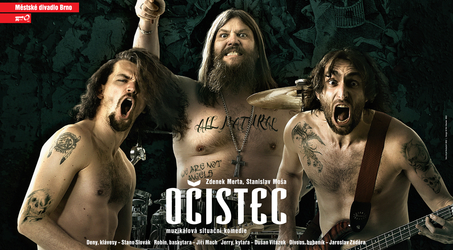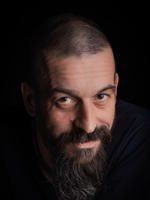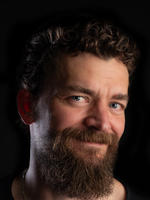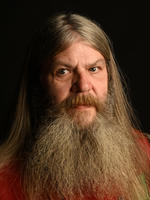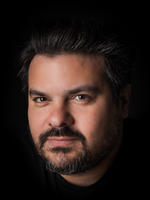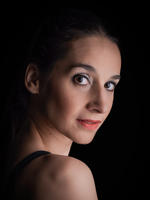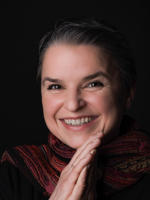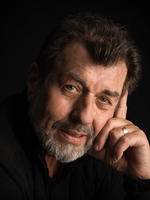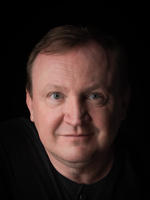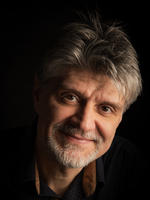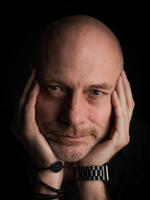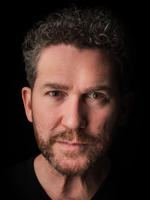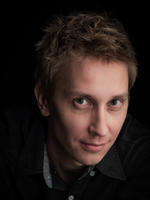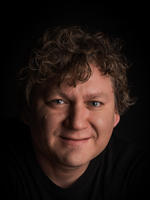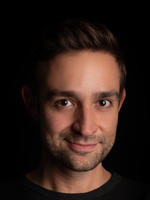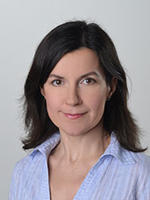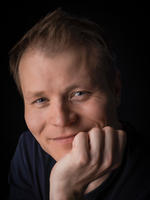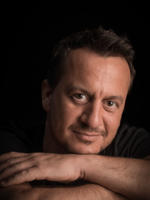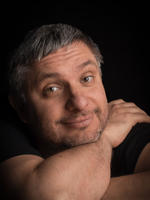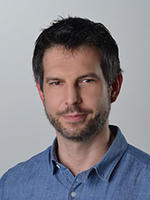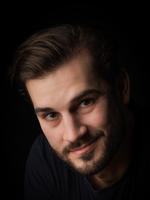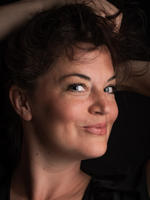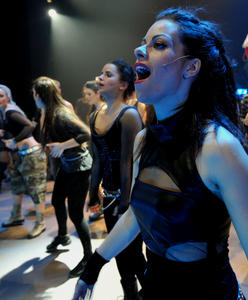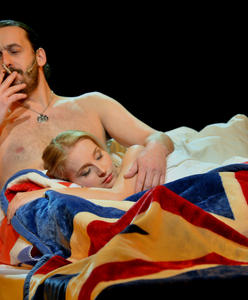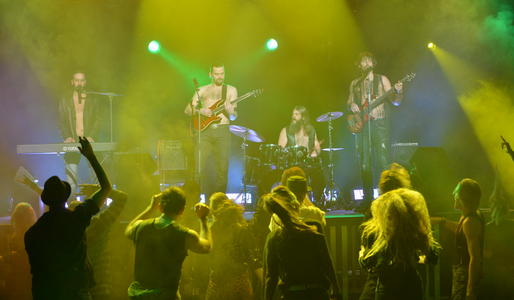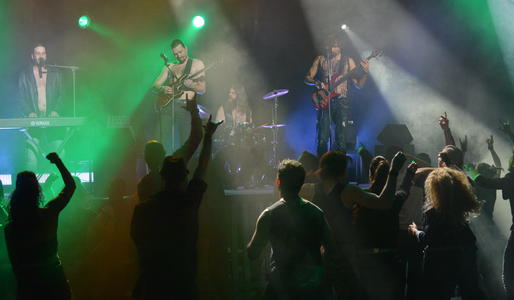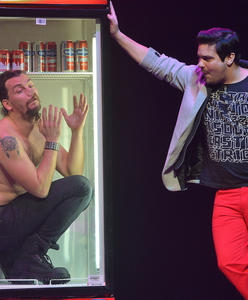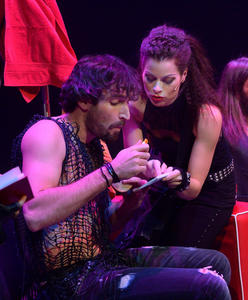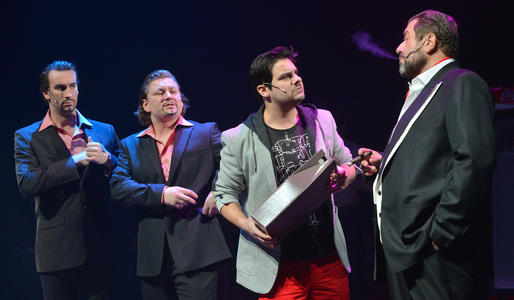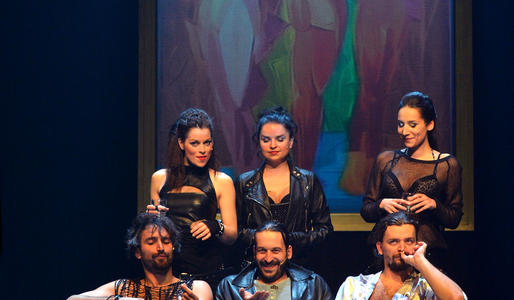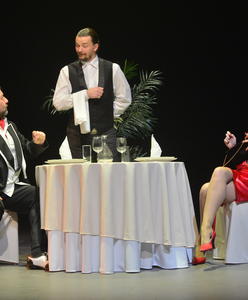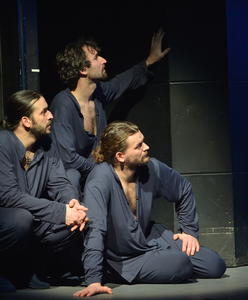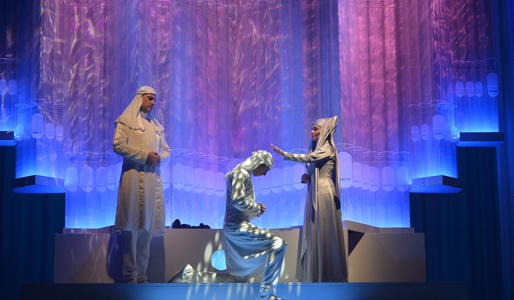PURGATORY AS A ROCK SHOW IN A MONASTERY
Kateřina Šebelová 3. February 2013 zdroj www.velkaepocha.sk
Brno City Theatre prepared the second part of the Divine Comedy musical trilogy with the subtitle Purgatory as a January premiere. The connection between the production and Dante´s novel is only thematic in nature. The authors of the production, the duo Moša-Merta, have changed almost everything in comparison with the previous Hell, from the genre and characters to the language and setting.
Rockers in a monastery...
A group of three friends – Deny, Jerry and Bas, who play together in a rock band, live a highly exuberant lifestyle. Their out-of-control behaviour leads to them ending up in a strange monastery with rather weird rules where very strict order is maintained. The young men are abducted to the monastery by three charming girls who will try, together with other members of the monastery, including the strict Mother Superior, to help the “naughty rockers” to find an alleged higher purpose by saying no to their joys and adhering to a strict regime.
Sins are presented to the young men both in the form of physical denial and suffering and via looking at the lives of those who succumbed to their pathological desires such as gluttony, sensuality or the desire for possessions, beauty and fame (Hitler, Stalin, Countess Báthory and the Maharaja of Dhar). However, it is a question whether the attempt to make these Bohemian men “better” and pure will be successful or if it everything will turn out completely different in the end…
Jaroslav Milfajt has proved once again that he is a master of his craft. His inventive and fully practical set provides the conditions both for a live rock concert and for the gloominess within monastery walls. On top of that, the huge functional organ and the large chessboard with thirty actors in motion squeezed onto it both offer a great spectacle.
Costume designer Andrea Kučerová also did a good job. As far as the music aspect is concerned, rock lovers will be pleased – they will have the opportunity to enjoy a live concert performed by the four main characters, including the quiet drummer Divous, alias the stage manager, Jaroslav Záděra, in an untraditional role.
Apart from the great singing by the cast, which comes as standard here at Brno City Theatre, a good performance is also provided by the choir singers under the leadership of Karel Škarka, and most of all by the thirty-member orchestra conducted by Dan Kalousek, which creates a tasteful musical background.
Charismatic rockers and demanding choreography
As far as the actor’s art is concerned, there is nothing at all to complain about – Slovák, Mach and Vitázek enjoy their roles, both on the podium as well as during other scenes in the monastery, and the pleasure of acting really radiates from them. Svetlana Janotová as Angela, Ivana Vaňková as Countess Báthory (who changes costumes with extraordinary skill) and Pavla Vitázková in the triple role of Eva, Krasotinka and Hurt´s wife are most interesting in the female roles. There is also an unforgettable duet featuring the silent Divous, Jaroslav Záděra, and Terka, Mária Lalková, which sees them drumming on a table. The chess game between Joe Stalin and Dolfy Hitler, where thirty actors change positions via some difficult choreography, is definitely one of the best scenes.
Brno City Theatre’s version of Purgatory offers a great show full of good music, fancy scenes and choreography with a colourful musical and singing accompaniment.
BRNO’S NEW MUSICAL: PURGATORY WAS WORTH WAITING FOR!
Peter Stoličný 23. January 2013 zdroj www.musical-opereta.cz
First, a simple fact: The librettist, director and manager of Brno City Theatre, Stanislav Moša, has created six original musicals together with musical composer Zdenek Merta. The last but one was HELL – the first part of a trilogy inspired by Dante´s Divine Comedy. The piece had its premiere in 2008 but it wasn’t until January 2013 that theatregoers could see the second part of that loosely-connected series, named PURGATORY. Why did it take so long – who knows? It was probably a matter of looking for the right motifs, the right expression.
Let’s give the authors a chance to speak: “A three-member group of free-thinking rockers find themselves, by chance, in some kind of strange monastery where they are forced to give up all that is physical and worldly, things which up to that moment they had considered to be the only and real meaning of their lives. Deny, Jerry and Bas are abducted to this strange place by three charming girls who, together with other members of their order, are trying to persuade them via direct confrontation that some kind of higher purpose is supposed to be the essence of human being. Headed by the Mother Superior, the monks and nuns allow the three “troublemakers” to look into the lives of those who went too far with their desire for bodily pleasures, money or gluttony and later had to pay for it mightily. We thus meet Countess Báthory, the Maharaja of Dhar, Joe Stalin and Dolfy Hitler. However, nothing is as unambiguous as it seems to be at first glance. It turns out that the Mother Superior has rather more pragmatic plans for her wards than what seems the case, but we will keep it secret as to who will achieve real purgation. Will it be the three unrestrained young men or the ethereal character of Angela, who knows no other world than that of the monastery?” The end of the story really shows that the animalistic force of the rockers is greater than the gloomy walls of the monastery. When that infectious music sounds through the building – a celebration of life begins in which the whole of purgatory suddenly disappears and everyone begins dancing happily because happiness is the aim of life which perhaps also God, in his infinite wisdom, might like us to enjoy.
I admit that as a spectator I was a bit frightened by the idea of Purgatory. I imagined the cruel images by Adam Michna of Otradovice (after the year 1600) who depicted all the horrors of torture in purgatory. I imagined Albrecht Dürer´s engravings from his Apocalypse. I thought about the strong religious dispute over the possibility of obtaining a pardon for a spirit in purgatory, according to Catholic belief, and thus ask for God´s blessing. Luther´s 95 theses stand against this; No. 11 states: When canonical penalties were changed and made to apply to purgatory, surely it would seem that tares were sown while the bishops were asleep. And then there is No. 14: Defective piety or love in a dying person is necessarily accompanied by great fear, which is greatest where the piety or love is least. And finally, he continues in No. 15: This fear or horror is sufficient in itself to constitute the pain of purgatory, since it approaches very closely to the horror of despair… I have already indicated how librettist Moša has dealt with Purgatory. He has luckily handled the whole topic philosophically on the one hand, asking about happiness and the right to be happy, even though it’s in a rough kind of way: sexuality, gluttony and the love of Mammon. On the other hand, worldly joys are so contagious that they end up victorious over the established dogmas. The wasteful rockers start off in a monastery where they have to put up with doing without things that were natural for them. The story seems like a Jesuit morality play (re-catholicization after 1620), but luckily the moral lesson failed. As was mentioned before, the rockers win!
The authors have approached their work, somewhat surprisingly (but luckily), as quite a jolly and disobedient revue with comic scenes intermingled with very nice songs and dancing. However, there is this train of thought, which we can either agree or disagree with, still remaining in the “background” of the story. I am starting to understand a bit the eternal hatred between Catholics and Evangelicals which has already cost so much unnecessary blood… But let´s get back to the story: Piano player and singer Deny (Stanislav Slovák), who accompanies us throughout the play and comments on everything that goes on, bass guitarist and singer Bas (Jiří Mach), who enjoys food so much that he considers it superior to everything, and Jerry, singer, guitarist and… sexual outlaw (Dušan Vitázek) play real live music on the stage, and they do it well. The trio is supplemented by a silent drummer, robust Jaroslav Záděra (who gave a really excellent performance of drumming on a table with Mária Lalková). Apart from this music there is, of course, an orchestra “in the pit” conducted by Dan Kalousek (this was at the premiere; otherwise it will also be conducted by young Ema Mikešková). Let´s also remember the practical set by Jaroslav Milfajt and equally practical costumes by A. Kučerová. The inventive choreography was prepared by the duo of Hana Kratochvilová and Aneta Majerová. A short word about the acting: We are already used to the fact that the singing and dancing as well as acting performances are of a high professional standard at Brno City Theatre. There are no small roles or “small” performances here. Moša has given a great (and not the first) opportunity to Stano Slovák. His commentary on the story and his sarcastic humour gave the production the right direction and pace, the right angle. As a result, even a “Jesuit morality play from a monastery” was suddenly seen from the rockers’ raffish point of view.
Apart from the actors’ demanding roles, perhaps the most important element of Purgatory is the authors’ ideas. For example, a huge organ which covers the whole stage originally only has whole tones – steps which you can play by walking up or down on them. The three rascals then also add “black” keys, highly-needed half-tones which can then be heard in their rock melody. Here, the music (steps – keys) is an active prop-based element of the story. The authors play with the showing of “examples” in an easy-going way. For example, there is a scene from the Kama Sutra in which the Indian “sutra” from the sixth century is in some beautifully illogical fashion connected with the Hare Krishna movement, which was founded by the American Goswami sometime in the 1960s. But it doesn´t matter! This is a wicked revue, not a historical epic. Equally entertaining are the two children, Stalin and Hitler, to the degree that they’ll fill you with horror. The same goes for multimillionaire Hurt (played excellently by Zdeněk Junák – in alternation with Milan Němec), who appears to be the key character at the beginning. It is he that threatens the rockers because one of them slept with his girlfriend. And it is Hurt again who, surprisingly, cooperates with the monastery – we eventually find out it was no coincidence that the musicians ended up exactly there. And again, it is the Mafioso Hurt who wants to watch how the rockers are re-educated... and when it is them who on the contrary re-educate the monastery (i.e. Purgatory), what will Hurt do? The authors let him simply disappear. It doesn´t matter! We are watching a beautifully disobedient revue.
I accepted the show for what it is. There are excellent songs, the actors move excellently and act believably. When Dušan Vitázek has an appetite for sex, we honestly feel sorry that he doesn´t have it. When Jiří Mach is hungry, we starve with him. And when Stano Slovák comments on his escapades, with almost black humour, we keep our fingers crossed for him as one usually does with a likeable rascal…
To conclude, one note regarding the music: There are many songs in Purgatory. Many of them could be hits, like the rock song “Corn” or the song “Maharaja”, in which one can hear “Hare Krishna”, or the song of longing “Questions”... we could go on. How is it that musical songs which literally move the drama forward become hits (e.g. Kander and Ebb’s Cabaret or the composition “Money”)? Perhaps it is a matter of marketing - forcing the songs into the media so that they are played - what is played becomes popular and then it is played again and again. I once asked Zdenek Merta why he doesn´t look after his songs –potential hits – more, and he just waved his hand. Apparently he doesn´t enjoy marketing. He prefers inventing new melodies.
Time for a resume of the whole narrative performance. This story is far removed from a tale of dark striving to obtain entry to heaven via “improvement” in the halfway house of Purgatory. This revue is clever, entertaining, mischievous and, well, simply pleasant. Fortunately. And now I´m asking myself a question: What will the third part of this very loose trilogy be like, i.e. Heaven? Let´s just wait and see. And when will it be? Hopefully it will arrive quicker than Purgatory, which kept us waiting for a rather a long time. But it was worth it.

